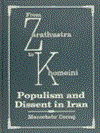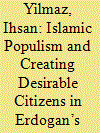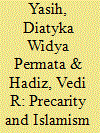| Srl | Item |
| 1 |
ID:
058560


|
|
|
|
|
| Publication |
Boulder, Lynne Rienner Publishers, 1990.
|
| Description |
xi, 220p.hbk
|
| Standard Number |
155587181X
|
|
|
|
|
|
|
|
|
|
|
|
Copies: C:1/I:0,R:0,Q:0
Circulation
| Accession# | Call# | Current Location | Status | Policy | Location |
| 032167 | 955/DOR 032167 | Main | On Shelf | General | |
|
|
|
|
| 2 |
ID:
164572


|
|
|
|
|
| Summary/Abstract |
Turkey’s Justice and Development Party (AKP) governments have managed to remove Kemalism only to replace it with an Islamist nation-building and social-engineering project that is as, if not more, authoritarian, conservative, and regressive than the Kemalist one. The Turkish education system has been transformed into a political tool to manipulate youth and mold them into cadres of a peculiar Islamist ideology supported by the Recep Tayyip Erdogan regime. This essay discusses four sets of educational tools that have been redesigned to enable Erdogan and his entourage to shape the worldview of younger generations of Turkish citizens.
|
|
|
|
|
|
|
|
|
|
|
|
|
|
|
|
| 3 |
ID:
190425


|
|
|
|
|
| Summary/Abstract |
This article investigates the link between growing precarity – associated with the process of neoliberal economic globalization – and growing Islamist tendencies in Indonesian society, through a case study of app-enabled transport workers. It applies a Gramscian notion of common sense to understand workers’ responses to their experiences of socio-economic marginalization and the articulation of their grievances. The combination of the near hegemony of a neoliberal worldview that encourages individual entrepreneurial prowess and an Islamist focus on moral self-cultivation inadvertently contributes to workers’ normalization of their precarity, furthering the atomization of the workforce. It also helps provide the setting for mobilizations of the urban precariat under Islamic banners, without challenging the imposition of neoliberal ideology on work and life.
|
|
|
|
|
|
|
|
|
|
|
|
|
|
|
|